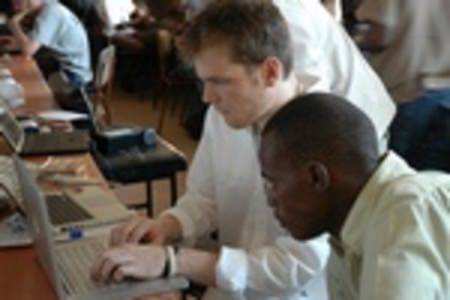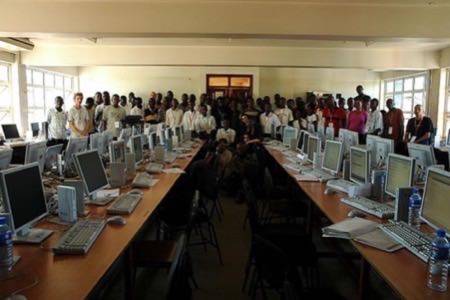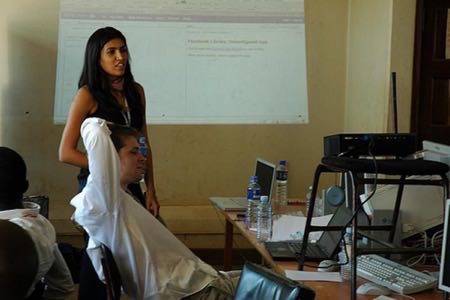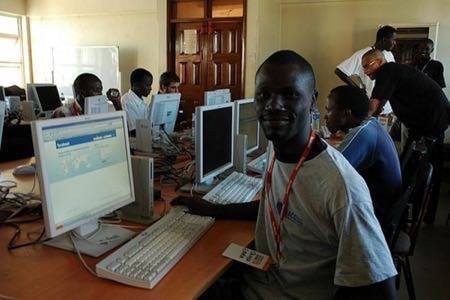Facebook senior engineer Charlie Cheever flew to Kampala, Uganda, a couple of weekends ago to lead a Facebook Developers Garage and teach 100+ East African students how to take advantage of the growing Facebook economy using the company’s apps platform and APIs. Leila Chirayath (founder of Samasource) and I (from Appfrica Labs) were also involved. The three of us organized this event to offer not only a hands-on workshop, but a concrete path for any developer in the region to expand his or her network and develop for an international audience.

Samasource helps East African small businesses and software developers find work by vetting them for Silicon Valley companies that could potentially work with them. My own company Appfrica Labs, is, among other things, an incubator that offers payment gateways.
One of the things that hinders private-sector engagement in sub-Saharan Africa is that banks offer very little in the way of credit systems. This means there is no PayPal, no oDesk, and no eLance. So even if you’re the smartest, most talented developer in the East African community, your options for making money are limited to groups you can physically interact with to receive payment. Meanwhile, most of the money coming into the region from developmental programs goes to government groups and often doesn’t end up in the hands of the people it’s intended to help. This creates a vacuum for entrepreneurs who have no sources of private funding, no source of government funding, and few ways to engage the outside world.
After the clinic was held, I caught up with Charlie and Leila to ask them about their experiences and views on the East African development scene.

Charlie Cheever, Facebook
Can you tell us a bit about yourself and your background at Facebook?
Charlie: Right now, I oversee platform engineering at Facebook, which encompasses our developer platform and Facebook Connect and some parts of the facebook.com website. I studied computer science in college, then worked at Amazon.com for a few years before joining Facebook.
You’ve mentioned that although Facebook covered all the costs of the actual Developers Garage, it wouldn’t sponsor your travel expenses. What inspired you to use your own money and resources to get here?
Charlie: Facebook’s been really supportive of our developer community. I wanted to make this trip to see Africa, and it worked out that you and Leila were able to set up a Dev Garage here.
Did your perception of Africa change after arriving here?
Charlie: Somewhat. The things that surprised me most were how knowledgable people were about American politics. One of our guides out in the national forest quoted McCain’s concession speech — and he didn’t seem unusual or anything. The cities here are more modern than you see in most movies or documentaries, but the villages can be pretty poor, and there’s not much infrastructure here outside of Kampala.
What were some of the challenges of running a session about developing for the web here? How did you overcome them?
Charlie: Most of the challenges here stem from the spotty connectivity. If you’re doing regular old web programming, you can just run things locally, and the connectivity isn’t too much of an issue. But when you’re making a Facebook app, there’s no way to get around the need for connectivity to Facebook. A related challenge is hosting. You want your server to be close to your end users and also to Facebook’s servers, and that’s tough to do in Africa.
What I ended up doing was making a Facebook app that the garage participants could type code into that would run on the hosting service I use. For the more advanced developers who wanted to make full apps, we used AppJet, which is a really cool free hosting service that uses server-side JavaScript. Things worked out pretty well, I thought.
One of the questions that came up a lot from the developers was about Facebook Connect: it’s still pretty early, but how is Facebook Connect changing things at Facebook?
Charlie: I think the biggest reason that so many people are excited about Connect is that now you can really start to see how Facebook and things like it are going to be a part of everything we do. Soon, I think we’ll have things like airlines adopting Connect and showing you people you know who are on the same flight as you and where they’re sitting. Today, we expect every business and service today to have a website; in a few years, we’ll expect everyone to integrate with Facebook and other web services.
Do you see Facebook playing a big role in changing the state of developing countries, either as an economic platform or as a way for people to communicate?
Charlie: As a way to communicate, definitely. What’s really cool is how small the gap is between the developing world and the US on this. Even outside of the event we put on, I saw a bunch of people using Facebook in Africa — and Facebook hasn’t even reached everyone in America yet and has only been around for 4 years. If you compare that to other game-chaning communication mechanisms, like landline phones, which have been wired up in America for decades but never really happened in most of the developing world, or even cell phones, for which the developing world has good connectivity but most people use pretty old school phones, it’s really cool to see how things are so similar in America and Uganda. The biggest reason for this is that the new wave of communication platforms, Skype, Twitter, Facebook, etc., are software-based, and it’s actually easier and cheaper to distribute the same software to everyone in the world, whereas with things requiring physical infrastructure, that isn’t true. Facebook is still evolving as an economic platform, and I don’t think the full power has been even close to realized yet. When we figure that out more, we’ll start to get a better idea of how it might change the economic landscape in the developing world. Right now, its hard to say how that will play out.
There’s a group in Egypt using Facebook to mobilize against the oppressive government. A similar group is using Facebook to support activism in Somalia. Is it exciting to see Facebook at the center of real change movements?
Charlie: It is really amazing. I think people have always organized like this, but one great thing about Facebook is that people like you and I can see how people in Egypt and Somalia are organizing as it’s happening, and I think with the proliferation of the web and tools like Facebook, these things can happen faster and more efficiently.
The other day I asked you why Facebook hasn’t implemented clean URLs, something most other social networks have. I was actually surprised at how much the response made sense. Can you repeat that for ReadWriteWeb readers?
Charlie: The main reason is that we want the Facebook product to be intuitive for everyone in the world, not just for technical people. In real life, most people keep track of their friends by their real names, not usernames like angeldog007, so we’ve tried to focus the product around using real names as much as possible. I think it makes it easier to find people on the site and also to find one’s way around the site. For a few things, like applications [http://apps.facebook.com/appname], we do have pretty URLs, so we do use them when we think it makes sense.
What would be your advice to other developers in the Valley who want to get involved in the African technology scene.
Charlie: The usual stuff: scour the web for anything you can find, read blogs, follow people on Twitter who you find, friend them on Facebook. Once you connect with people in the scene, getting involved is easy. The African tech scene has a few quirks, but overall it’s pretty similar to tech communities everywhere else in the world.
What is your advice to “third-world” computer science students who want to work for Facebook?
Charlie: The most important thing I think you can do is find a way to get yourself a great Internet connection and then spend a lot of time building things and teaching yourself stuff — beyond just doing schoolwork. After that, I’d work on finding a way to physically get to Silicon Valley. Even in today’s high-tech connected world, there’s really no substitute for proximity.
Leila Chirayath, Samasource

Why did you start Samasource?
Leila: I think the biggest tragedy associated with poverty is wasted talent. As a volunteer teacher in Ghana in my late teens, I was struck by how bright my students were and how few opportunities they had to use their skills productively. We have this perception in the US that the world is a reasonably functioning meritocracy — in fact, it’s much more like a lottery.
I became a management consultant after graduating from college, and my first client was a large outsourcing company in Mumbai. I’d walk the halls after work and discovered that many of the staff lived in slum communities around the city and were supporting entire families with their incomes. For young Indians, these jobs offered an entry into global business and a shot at putting their talents to use.
I began thinking about a system that would encourage greater local ownership — by workers, rather than large multinational companies — and extend the benefits of outsourcing to skilled workers in the bottom billion.
Can you explain some of the challenges you face in the US in advocating for small businesses in developing countries?
Leila: Where do I begin? Our biggest challenge is convincing people that there is a surplus of skilled talent in very poor regions, particularly Africa. The general response is, “Don’t people there need to focus on the basics — agriculture, health, education — rather than on trying to build service companies?” Years of development studies have given us the answer to that question: the only sustainable path out of poverty for many poor countries is increased international trade, particularly in industries that rely on human capital.
People tend to irrationally aggregate the countries in Africa, which leads many to believe that doing business anywhere on the continent entails driving through refugee camps or bribing corrupt officials. Potential clients are shocked when we show them videos of our partner firms in Nairobi in modern office buildings, filled with educated young people in suits. We spend a good deal of time repairing Africa’s public image and convincing clients that doing business with small, locally owned service companies in places like Uganda is a win-win: they can lower their costs while contributing to sustainable economic development.
What kind of support does Samasource have already, and what kind of support would help you sustain your model?
Leila: Samasource was a second-place winner in the global Business in Development Challenge in December 2007 [a $22,000 award] and the Stanford Social Enterprise Challenge in April 2008 [a $12,000 award], which funded our feasibility study and the launch of our pilot earlier this year. We have received countless hours of volunteer support to build our initial website and sales team.
The nice thing about our model is that we’re sustainable: Samasource makes a commission on work we broker for the providers in our global network. We’re trying to raise about $350,000 to build out the organization, and after that we plan to run our organization largely on earned income.
Is the world financial crisis affecting any of the small firms you work with?
Leila: We have eight small firms in our network: in Kenya, rural India, and Nepal. The biggest hit our firms took was during the Kenyan elections crisis earlier this year. Many US companies left Kenya immediately, though there were few actual service interruptions.
The global financial crisis may make it harder for our firms in developing countries to raise capital for expansion, but it will likely have a positive impact on sales. Outsourcing tends to grow when client companies are pressed for cash.
What did you think about the Kampala Dev Garage? You’ve done these in Ghana and Kenya. How did Uganda compare?
Leila: We were lucky to have Charlie attend in person. In Nairobi, we were only able to patch in Silicon Valley coaches via online chatrooms. With the spotty Internet connection we had there, it was very challenging to coordinate 80 people in chat rooms at once. I think having someone attend from Facebook was also really exciting for students. Silicon Valley engineers rarely spend much time in sub-Saharan Africa. Charlie also had a chance to learn what the local technology scene was like and will transfer that knowledge to his peers in the Valley.

This interview is a follow-up to an audio interview I conducted with Charlie and Leila on Appfricast. I also conducted an interview with three attendees (one Peace Corps volunteer, one local student, and one successful East African entrepreneur) to see if they thought the workshop was relevant and how it would directly impact their lives. You can listen to that podcast here.
Appfricast is a weekly podcast about the African technology scene. Appfrica Labs is an incubation program for software entrepreneurs in East Africa modeled on Paul Graham’s YCombinator. Photos by TMS Ruge, Leila Chirayath, and various attendees. You can find the Kampala Facebook Developers groups here. More photos from the day here.
Disclosure: it was mentioned at the top of this post, but to reiterate that the author Jonathan Gosier’s company Appfrica Labs was one of the 3 organizers of the event described here. Jonathan Gosier is a web developer and social entrepreneur living and working in Kampala, Uganda.

















